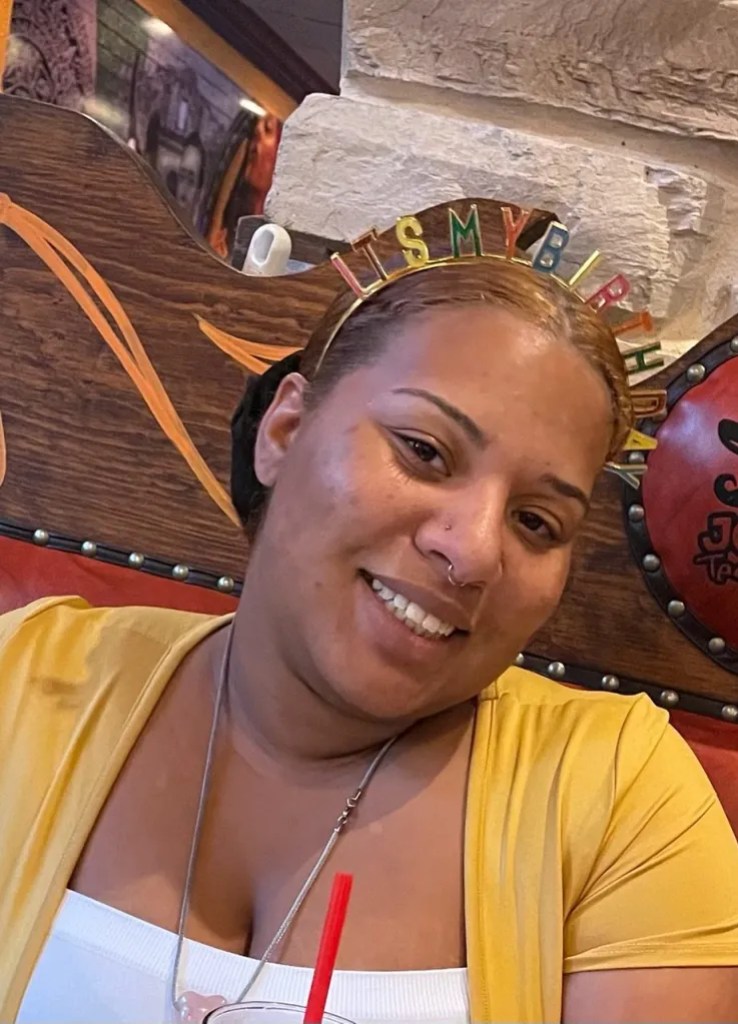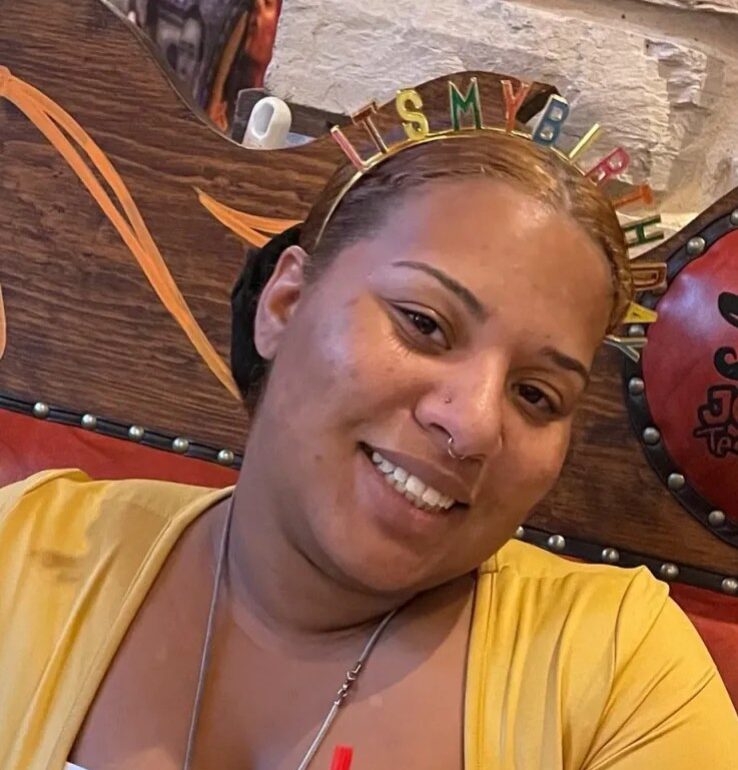Ten days before Christmas, a Virginia state court judge will determine if Deja Taylor should receive the maximum sentence of five years in prison for child neglect. Taylor’s 6-year-old son carried her handgun to school in January and shot his teacher.
The 26-year-old Newport News mom has already started a 21-month federal prison sentence in connection to the purchase of the gun used. The teacher, who survived the shooting and multiple surgeries, has filed a $40 million lawsuit against the school district for negligence.
As prosecutors increasingly go after the parents of children involved in shootings, some legal advocates fear Black parents will be disproportionately prosecuted in the push for more accountability. Taylor is among a handful of parents criminally charged this year and sentenced to prison for their child’s offenses when they get a hold of their firearm.
Since May, there have been at least five Black moms and dads across the country who have been charged for their children — ages 2 to 8 — getting access to their firearm. Taylor was charged in January. In other cases, parents were charged in tragedies that included accidental self-inflicted deaths. The parent or parents were charged with either a misdemeanor or felony child neglect; in one case, a weapon charge was added.
The central questions advocates are asking in Taylor’s case are whether the punishment fits the crime and is locking her up in the best interest of her son, who turned 7 in June.
Advocates caution against tearing families apart because incarceration only causes additional harm — and there are alternatives. Sending Taylor to prison and away from her son is a “grave injustice,” says Michael Mitchell, an assistant professor of African American studies and criminology at the College of New Jersey.
“There are other, healthier ways, and probably more prosocial ways, to repair harm that is done,” says Mitchell, a former correction officer who co-authored a 2019 research study titled: “Formerly Incarcerated Black Mothers Matter Too: Resisting Social Constructions of Motherhood.”
According to a 2010 Pew Research Center report, 1 in 9 Black children, 1 in 28 Hispanic children, and 1 in 57 white children in the U.S. have an incarcerated parent. Those statistics have not changed to date.
What is the appropriate punishment and the alternatives?
Jimmy Ellenson, one of Taylor’s attorneys, says Taylor has been sitting in a local detention center since Nov. 15 without the treatment or resources she needs to address her substance use and maintain her mental health.
Ellenson says the best route for her is for the Federal Bureau of Prisons to send her to a nine-month residential drug treatment program and then to a halfway house in Newport News for six additional months. But those options are not guaranteed.
“She’s getting no services right now. She’s just wasting time,” Ellenson told Capital B.

The family is repeating a cycle. Taylor was raised by her grandfather. Her mother was “around” and her father was incarcerated, Ellenson said. By the time she was 15 she had turned to drugs, mostly marijuana.
For the next decade, her addiction continued and her mental health was on a decline following a series of miscarriages before giving birth to her son.
And there were other challenges.
During an April 2021 traffic stop for speeding in Williamsburg, Virginia, police smelled and spotted marijuana as well as edibles that looked like Rice Krispie Treats next to her son, who was 4 years old at the time. She denied knowing about the drugs, and another person in the car claimed ownership of a backpack filled with drugs.
That same year, her son, who Taylor says has ADHD, had a rocky start entering into Richneck Elementary School in Newport News. There were documented behavior-related incidents that kept him out of the classroom for the majority of pre-K and kindergarten, and he did not have an Individualized Education Program in place.
In 2022, just months before the January shooting at the school this year, Taylor filled out a firearm permit application and denied being an “unlawful user of marijuana or other controlled substances.” The application plus the amount of marijuana found inside her home weeks after the shooting led to her federal charges.
“She said ‘no’ that she wasn’t addicted to drugs when we all knew she was,” Ellenson says. “Really, I don’t know if Deja herself knew to what extent she had a substance abuse problem for her to admit she knew it.”
Virginia legalized recreational and medical marijuana in 2021. The state does not have any laws on storing a firearm in a lock box, but it is illegal to leave a loaded gun around a child under 14.
Mitchell argues that in cases like Taylor’s, alternatives to incarceration such as restorative justice practices are designed to create a dialogue between the parties involved while preventing more parents from being funneled through the prison system.
“Could we argue that it was a case of negligence? Yes, but I also think we have to consider, again, the larger toll, a deeper toll, that her incarceration is going to have, not only on herself, but her child,” Mitchell says.
“Over the last decade, problem-solving courts have continued to expand in the federal system,” with alternatives to incarceration programs, according to a December 2021 federal report. Probation, parole, community service, and drug-treatment courts are other options.
In 2022, 80% of the over 2 million incarcerated women were mothers. While stints in jail are less than a year, “even a short jail stay can be devastating, especially when it separates a mother from children who depend on her,” according to a report by the Prison Policy Initiative.
“Research on depression and aggression among children of incarcerated parents … found that Black children and children who have both a mother and a father incarcerated exhibited significant increases in depression,” according to an article published in the Justice Department’s National Institute of Justice Journal.
Incarceration does little to address mental illness and substance use disorder, “and often, it compounds the problems. The impact of this is that when women leave incarceration, their health is often worse than when they entered,” according to a new study released by the National Black Women’s Justice Institute.
More than half of the 21 Black women who were formerly incarcerated in California and participated in the study reported having a “mental illness, substance use disorder, or both, which they directly connected to traumatic experiences before incarceration and the exacerbating effect of the carceral environment itself.”
Sharon Content is founder of Children of Promise, NYC, a New York-based nonprofit organization dedicated to providing support resources for children and families of incarcerated parents. She says that Taylor’s son needs proper mental health services, and she hopes for Taylor’s sake that there’s a program in Virginia.
“Unless you have an outlet that allows the [child] to process what they’re feeling, they’re going to internalize it. And in their own way, it’s going to manifest into some negative behavior,” she says.
With Children of Promise, NYC, “[children] remain in our program for several years, because once mom and dad come home there is still so much work to be done,” Content said. She added that it’s those mental health services that allow children to really talk through the pain. “He is [Taylor’s son is] going to be in pain.”
What happens next?
Taylor’s grandfather, Calvin Taylor, a military veteran and retired correction officer, has been granted full custody of her son.
After pleading guilty in June, Deja Taylor’s pretrial release conditions, which included substance abuse counseling, continued. It was her chance to prove to the judge that she wasn’t addicted to drugs. She was facing up to 25 years in federal prison, and she still kept testing positive for drugs.
Ellenson believes that if Taylor’s drug tests had been negative, the judge wouldn’t have sentenced her to prison.
When negotiating plea agreements, Michael Heiskell, the president of the National Association of Criminal Defense Lawyers, says his members and other mitigating specialists will have to prepare for more cases like Deja Taylor’s in the future because of the snail’s pace of efforts to reform gun laws and “the prevalence of guns in households.”
“So that the appropriate sentence can, in fact, be imposed, and not just simply lock people up. That’s not doing anyone any good,” Heiskell said, adding, “And, we have to balance the collateral consequences stacked against the parent and the child when the parent is released.”
In June, Calvin Taylor told the Richmond Times-Dispatch that his great-grandson has been doing well at a new school and that the child’s father and his granddaughter had “limited involvement” since he was granted full custody.
“They’re always gonna be his parents, but until they can get their lives together, that’s how we are gonna be,” Calvin Taylor told the news outlet.
His granddaughter is expected to be sentenced on Dec. 15.
This post was originally published on this site be sure to check out more of their content.









